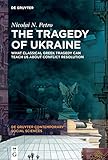The Tragedy of Ukraine : What Classical Greek Tragedy Can Teach Us About Conflict Resolution / Nicolai N. Petro.
Material type: TextSeries: De Gruyter Contemporary Social Sciences ; 9Publisher: Berlin ; Boston : De Gruyter, [2022]Copyright date: ©2023Description: 1 online resource (XIII, 285 p.)Content type:
TextSeries: De Gruyter Contemporary Social Sciences ; 9Publisher: Berlin ; Boston : De Gruyter, [2022]Copyright date: ©2023Description: 1 online resource (XIII, 285 p.)Content type: - 9783110743241
- 9783110743470
- 9783110743371
- Conflict management -- Ukraine
- Greek drama (Tragedy) -- History and criticism
- Greek drama (Tragedy) -- Themes, motives
- Ukraine Conflict, 2014-
- Identität
- Kulturelle Identität
- Politische Krise
- Ukraine
- POLITICAL SCIENCE / Geopolitics
- Greek tragedy
- Maidan
- Russia
- Ukraine
- Ukrainian politics
- conflict resolution
- 947.7086 23/eng/20230110
- DK508.852 .P475 2023
- DK508.852 .P48 2023
- online - DeGruyter
- Issued also in print.
| Item type | Current library | Call number | URL | Status | Notes | Barcode | |
|---|---|---|---|---|---|---|---|
 eBook
eBook
|
Biblioteca "Angelicum" Pont. Univ. S.Tommaso d'Aquino Nuvola online | online - DeGruyter (Browse shelf(Opens below)) | Online access | Not for loan (Accesso limitato) | Accesso per gli utenti autorizzati / Access for authorized users | (dgr)9783110743371 |
Browsing Biblioteca "Angelicum" Pont. Univ. S.Tommaso d'Aquino shelves, Shelving location: Nuvola online Close shelf browser (Hides shelf browser)
Frontmatter -- Contents -- List of Figures and Tables -- Acknowledgements -- Introduction -- A Note on Transliteration -- Chapter One What Does Athens Have to Do with Kiev? -- Chapter Two Two Nations in One State -- Chapter Three The Fatal Attraction of the Far Right -- Chapter Four The Mental Habits of Nationalism -- Chapter Five The Tragedies of Crimea and Donbass -- Chapter Six A Flawed Peace -- Index
restricted access online access with authorization star
http://purl.org/coar/access_right/c_16ec
The conflict in Ukraine has deep domestic roots. A third of the population, primarily in the East and South, regards its own Russian cultural identity as entirely compatible with a Ukrainian civic identity. The state’s reluctance to recognize this ethnos as a legitimate part of the modern Ukrainian nation, has created a tragic cycle that entangles Ukrainian politics. The Tragedy of Ukraine argues that in order to untangle the conflict within the Ukraine, it must be addressed on an emotional, as well as institutional level. It draws on Richard Ned Lebow’s ‘tragic vision of politics’ and on classical Greek tragedy to assist in understanding the persistence of this conflict. Classical Greek tragedy once served as a mechanism in Athenian society to heal deep social trauma and create more just institutions. The Tragedy of Ukraine reflects on the ways in which ancient Greek tragedy can help us rethink civic conflict and polarization, as well as model ways of healing deep social divisions.
Issued also in print.
Mode of access: Internet via World Wide Web.
In English.
Description based on online resource; title from PDF title page (publisher's Web site, viewed 02. Mai 2023)









